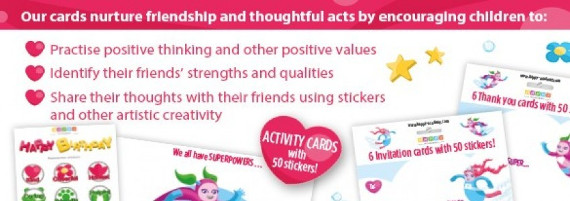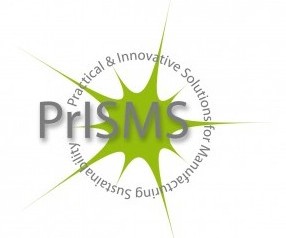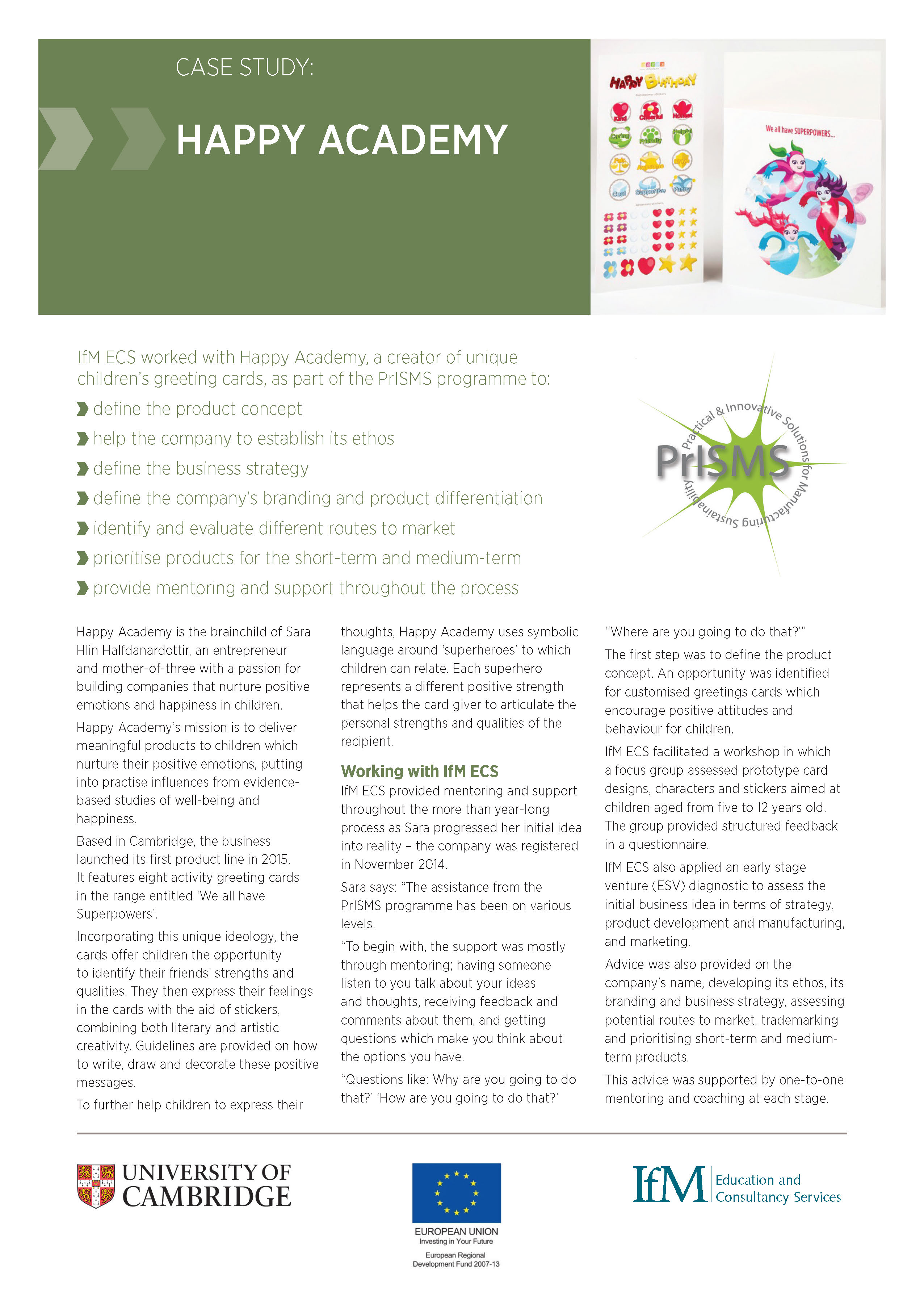Happy Academy: children's greetings cards that nurture positive emotions

Happy Academy is one of more than 100 smaller manufacturers that IfM ECS is working with as part of the PrISMS programme – and this case study highlights the difference it has made. The company aims to deliver meaningful products to children which nurture their positive emotions. It launched its first product line in 2015, featuring a series of activity greeting cards in the range entitled ‘We all have Superpowers’.
The cards offer children the opportunity to identify their friends’ strengths and qualities.IfM ECS worked with Happy Academy as part of the PrISMS programme to:
|
define the product concept |
|
|
help the company to establish its ethos |
|
|
define the business strategy |
|
|
define the company’s branding and product differentiation |
|
|
identify and evaluate different routes to market |
|
|
prioritise products for the short-term and medium-term |
|
|
provide mentoring and support throughout the process. |
Happy Academy is the brainchild of Sara Hlin Halfdanardottir, an entrepreneur and mother-of-three with a passion for building companies that nurture positive emotions and happiness in children.
Happy Academy’s mission is to deliver meaningful products to children which nurture their positive emotions, putting into practise influences from evidence-based studies of well-being and happiness.
Based in Cambridge, the business launched its first product line in 2015. It features eight activity greeting cards in the range entitled ‘We all have Superpowers’.
Incorporating this unique ideology, the cards offer children the opportunity to identify their friends’ strengths and qualities. They then express their feelings in the cards with the aid of stickers, combining both literary and artistic creativity. Guidelines are provided on how to write, draw and decorate these positive messages.
To further help children to express their thoughts, Happy Academy uses symbolic language around ‘superheroes’ to which children can relate. Each superhero represents a different positive strength that helps the card giver to articulate the personal strengths and qualities of the recipient.

Working with IfM ECS
IfM ECS provided mentoring and support throughout the more than year-long process as Sara progressed her initial idea into reality – the company was registered in November 2014.
Sara says: “The assistance from the PrISMS programme has been on various levels. To begin with, the support was mostly through mentoring; having someone listen to you talk about your ideas and thoughts, receiving feedback and comments about them, and getting questions which make you think about the options you have. Questions like: Why are you going to do that?’ ‘How are you going to do that?’ ‘‘Where are you going to do that?’”
The first step was to define the product concept. An opportunity was identified for customised greetings cards which encourage positive attitudes and behaviour for children. IfM ECS facilitated a workshop in which a focus group assessed prototype card designs, characters and stickers aimed at children aged from five to 12 years old. The group provided structured feedback in a questionnaire.
IfM ECS also applied an early stage venture (ESV) diagnostic to assess the initial business idea in terms of strategy, product development and manufacturing, and marketing. Advice was also provided on the company’s name, developing its ethos, its branding and business strategy, assessing potential routes to market, trademarking and prioritising short-term and medium-term products.
This advice was supported by one-to-one mentoring and coaching at each stage.
From focus group to first product
The IfM ECS team worked closely with Sara at each stage to develop her company from the outset.
|
Establishing the company ethos and its branding strategy: Workshop sessions with IfM ECS helped to define the company’s core values, the unique attributes that differentiate it from competitors, and the branding strategy |
|
|
Defining the core products and business strategy: Children’s greeting cards were prioritised as the core product in the short term, along with the development of the Happy Academy ‘superhero’ characters on the website. The medium term will focus on a pipeline of other cards and stationery products |
|
|
Identifying potential routes to market: A Masters degree student from the University of Cambridge, under the supervision of one of the IfM ECS team, undertook an extended project to assess the greeting card market, identify opportunities and evaluate various routes to market |
|
|
Marketing planning: IfM ECS used its prototype marketing planning tool for start-ups and SMEs to help Sara to define and choose product attributes, as well as understand the market environment, customer needs, her business capabilities and resources |
|
|
Trademarking: Advice was given on how to prevent competitors from copying Sara’s ideas, including trademarking products in different countries |
|
|
Naming the company: There was early feedback from a focus group on Sara’s ideas for the company name and logo, a process that eventually led to the Happy Academy name |
|
|
Continuing coaching and mentoring: At each stage, Sara could draw on advice and mentoring to help her to structure and focus her business ideas. |
In parallel with the IfM ECS engagement, Sara worked with a designer and copywriter to develop the characters and designs for her cards and associated products. Happy Academy applied for, and received, an ERDF grant to cover some of the costs involved in this process. The first cards were launched in 2015.
Commenting on the help she has had from IfM ECS, Sara says: “Having a mentor keeps you focused and on track with your idea.
“They are constantly helping you to solve problems, or asking colleagues for solutions, or sending me links with information which can lead me to solve the problem. This type of support is extremely important, especially at the beginning of the process where your head is everywhere, spinning with many ideas.
“The mentoring kept me on track, helped me to simplify things and focus on what is important.
“You are driven by the passion of what you are doing. Between meetings, you are constantly thinking about the project. You want to deliver solutions and add ideas and values to your business idea. In return, you get all the support you want and need.”
For more on Happy Academy visit www.happy-academy.com.
|
PrISMS The PrISMS (Practical & Innovative Solutions for Manufacturing Sustainability) programme aims to transform the growth prospects of 50 start-ups and 70 smaller manufacturers across the Eastern Region – creating more than 140 new jobs and safeguarding many more. The programme is funded by the European Regional Development Fund (ERDF), with match funding from the EPSRC Centre for Innovative Manufacturing in Industrial Sustainability, ideaSpace and IfM Education and Consultancy Services (IfM ECS) and supported by 11 county and district councils in the region. It is managed and delivered by IfM ECS, which bases its methods on research at the University of Cambridge’s Institute for Manufacturing (IfM). For more information visit here. |
|
IfM ECS IfM Education and Consultancy Services works with companies of all sizes to help create and capture value and with national and regional governments to support and grow their industrial sectors. It does this by transferring the new ideas and approaches developed by researchers at the Institute for Manufacturing (IfM) through a programme of education and consultancy services. IfM ECS is owned by the University of Cambridge. Its profits are gifted to the University to fund future research activities. For more details on its work with SMEs visit here. |
|
ERDF PrISMS is part-financed by the East of England European Regional Development Fund (ERDF) Programme 2007-2013. The Department for Communities and Local Government is the managing authority for ERDF in England, which is one of the funds established by the European Commission to help local areas stimulate their local development by investing in projects which will support local businesses and create jobs. The East of England ERDF programme (covering Bedfordshire, Cambridgeshire, Essex, Hertfordshire, Norfolk and Suffolk) supports low carbon economic growth and has allocated approximately €95 million. |
Download the case study here.
For further information about the work of IfM ECS in the PrISMS programme please contact contact Nicky Athanassopoulou on +44 (0)1223 760376 or naa14@cam.ac.uk; or John McManus on +44 (0) 1223 764908 or jm694@cam.ac.uk.










